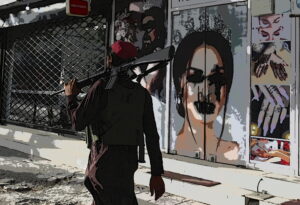Nafisa Noorzai was in the courtyard of her house on October 7th, when an Earthquake hit the Province, Herat at 11:15 in the morning.
Herat is in the West of Afghanistan, close to the Iranian Border. Especially the rural areas were affected most. Nafisa Norzai lived in Butan in the district Zindajan, a village 50 km away from the city Herat. Her House collapsed while her 17th year-old daughter was still inside. Nafisa’s neighbor’s found her daughter’s body under the rubble after three hours.
The mother is in despair. The 48 years old is living in a tent now, she is alone. Nafisa Norzai is shocked and still does not accept that her daughter died under the ruins of the house. The neighbors are trying to take care of her. They give her some rice and oil once in a while, but usually, she refuses to eat. She doesn’t have any facilities to cope with the cold weather in autumn. Only once a male doctor came to check on her.
In October, three strong earthquakes occurred in Herat, western Afghanistan, killing nearly 5,000 people according to Local Officials, injuring thousands, and destroying hundreds of houses.
The WHO mentioned that more than 90% of the victims of this earthquake were women and children because they are not allowed to leave the house without a male relative according to regulations imposed by the Taliban. So most women stay home steadily. Some doctors and helpers say that the extensive restrictions imposed by the Taliban have caused most of the women to die in the catastrophe, the WHO reports.
Salma a female doctor from Herat, was able to reach the affected areas to provide first aid to injured women and witnessed the disproportionate causes of casualties. She says: “I visited a village where Taliban members live. Some men refused to touch wounded or dead women.”
Maryam, a 23-year-old a helper, witnessed the Taliban warning rescue workers not to touch women caught in the earthquake.
“The local men had no problem with rescuing the women, but there were some armed members of the Taliban who did not allow the men to approach them,” Maryam said.
She added, “They also prevented women from going to the earthquake areas in the first two or three days because they didn’t want men and women to be there.”
The names of these two interviewees have been changed in this report to protect their security.
As the weather gets colder, people affected by the earthquake need more humanitarian aid. They urgently need health services, drinking water, food, shelter, and help to stay safe.





